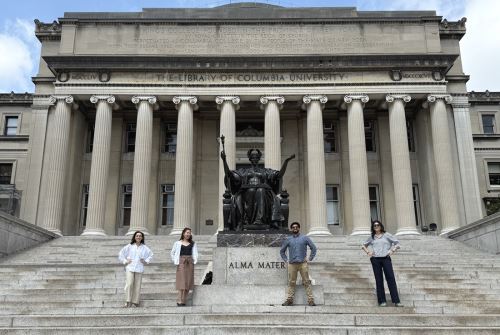Miguel Angel Santivañez, a 26-year-old Peruvian architect, is studying at Columbia University in New York thanks to the 2025 Bicentennial Generation Scholarship, which recognized him as the national first-place winner.
From the city that never sleeps, the student is pursuing a postgraduate degree in urban design with the goal of transforming cities' vulnerabilities into opportunities for resilience and equity.
Although Santivañez had already been studying for several weeks in the Master of Science in Architecture and Urban Design, he did not know whether he would have full funding to continue. Support from the Peruvian State arrived just in time to spare him from international debt.
"I received the news while working with classmates on one of the most important courses of the semester; the call from my girlfriend, telling me I had won, brought immense joy and relief," he told Andina News Agency from New York.
Columbia University is known for integrating design and research to address challenges that architecture alone cannot solve — an approach that attracted Miguel Angel to the program.
Now, with the scholarship secured, he studies with peace of mind, although he acknowledges the great responsibility that comes with having earned first place in this Peruvian government competition.
Strong credentials
Miguel Angel studied Architecture at the Pontifical Catholic University of Peru (PUCP), where he became interested in urban planning and the transformation of public spaces. Throughout his career, he has combined academic research, teaching, and public management.
He served as a teaching assistant, a research assistant, and worked in the Prolima program of the Municipality of Lima, which is dedicated to the recovery of the city's historic center. At the same time, he participated in social housing competitions, published a book, and received a distinction at the 2023 National Architecture Biennial.

Learning from diversity
Now settled in New York, Miguel Angel shares classes with students from over 20 countries. His workgroup includes peers who speak various languages, with English as the predominant one. For him, this diversity is an opportunity to rethink the role of design professionals in global contexts.
"In my program, there are just over 50 of us in architecture and urban design, and we come from nearly 24 different nationalities. Each person carries a story, and I believe it's not just about learning from professors or classes; it's also about learning from classmates who can share those life experiences — not just as architects, but as people," he noted.
The program's demands have been considerable. Miguel is taking intensive workshops in urban design and seminars on resilience, environmental justice, and territorial planning.
"Urban design is a tool capable of transforming vulnerabilities into opportunities, and I believe that —through these experiences in environmental justice and urban equity— I aspire to create frameworks that empower communities to build resilience through prevention and interdisciplinary collaboration," he expressed.
Commitment
For Miguel Angel, the scholarship is more than just an academic experience — it represents a commitment.
He dreams of creating an urban research center in the Global South, where young professionals, communities, public institutions, and experts can work together.
"That's my dream: to create a space that promotes ecological restoration and urban equity projects in intermediate cities and territories affected by migration and, ultimately, climate change. To generate knowledge from experiences that come from different places, where our cities are not merely places for survival, but environments for shared well-being," Santivañez expressed.
That is why one of the contributions he proposes is active listening to those who know the problems of cities best: their inhabitants.
"That commitment is not only to the discipline I practice, but also to the people who live in the different territories of our country. It's key to narrowing these gaps and ensuring that opportunities are open to everyone," he added.
The sky is the limit
To those who think studying abroad is impossible, Miguel Angel said: "don't give up."
"The sky is the limit. The opportunity to apply shouldn't be tied only to success, but also to the power of trying. In these times of uncertainty that we have lived through in Peru, being awarded a scholarship by the National Scholarship and Educational Credit Program (Pronabec) is a true privilege. The thought that a dream can come true by traveling and understanding other realities to enrich —and also give back what you have learned to the country— is a very powerful motivator," he pointed out.
Santivañez said the most valuable thing he has learned is that success is not linear.
"It's a great opportunity for anyone, wherever they are, to allow themselves to apply, make mistakes, and try again. It's not a linear path of success after success, but rather about how one improves through their failures," he concluded.
(END) JMP/RRC/MVB